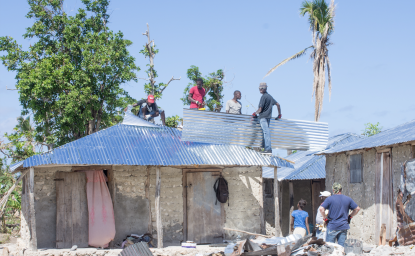ECSP Director Geoff Dabelko Speaks on Politics of Environment at St. Edward's University
OCTOBER 2007—New Players Influencing the Debate in Congress
OCTOBER 2007—New Players Influencing the Debate in Congress
The public debate on climate change in the United States is fundamentally different today than it was just a year ago. Growing interest from the faith-based community, the private sector, military leaders, and states and localities is changing the dynamics of the congressional debate on climate change, ECSP Director Geoff Dabelko told a packed auditorium at St. Edward's University in Austin, Texas, on October 15, 2007. Dabelko was joined by Kent Hughes, director of the Wilson Center's Program on Science, Technology, America and the Global Economy and consulting director of its Global Energy Initiative, and Don Wolfensberger, director of the Center's Congress Project. The three Wilson Center directors offered their assessments of current issues before the U.S. Congress as part of the Kozmetsky Center of Excellence in Global Finance's lecture series.
Climate change has become one of the most frequently discussed environmental issues on Capitol Hill, and the presence of Democratic majorities in both houses of Congress makes climate change legislation a more likely prospect, said Dabelko. Yet a Democratic majority certainly does not guarantee action on climate change and other environmental issues. For instance, according to Dabelko, the House's version of the 2007 Farm Bill would have a raft of negative environmental impacts.
During the past year, Congress has been taking steps to reassert a prominent U.S. leadership role on climate change and other environmental issues. For instance, a high-profile congressional delegation—perhaps led by Speaker of the House Nancy Pelosi—will attend the UN climate talks in Bali in December 2007. Congress has also been pushing the Bush administration to use U.S. foreign assistance to raise the profile of less prominent environmental issues such as water and sanitation. Here, as with climate change, civil society groups such as Rotary International and faith-based groups such as Living Water International have actively pressured Congress to help developing nations increase access to potable water—and to make good on existing legislation that prioritizes these issues, such as the Senator Paul Simon Water for the Poor Act of 2005. Water and sanitation issues mark a notable area of bipartisan consensus, in contrast to the typically politicized atmosphere surrounding environmental issues.
There are dual motivations for U.S. action on environmental issues, argued Dabelko. The primary reason to act is the importance of the environmental issues themselves, but it is also appropriate to consider the price the United States has paid in other diplomatic arenas for its lack of leadership on environmental challenges. Dabelko believes re-engagement on important environmental issues could advance other U.S. strategic interests.

The Environmental Change and Security Program (ECSP) explores the connections between environmental change, health, and population dynamics and their links to conflict, human insecurity, and foreign policy. Read more



